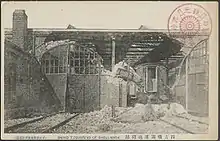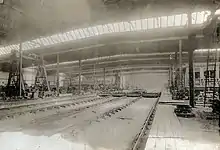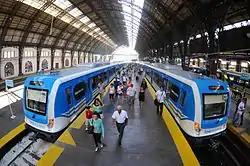 Gate of Qingdao Sifang Jihongtan Manufacturing Base | |
Native name | 中车青岛四方机车车辆股份有限公司 |
|---|---|
| Formerly | CSR Qingdao Sifang Co., Ltd.[1] |
| Type | Subsidiary |
| Industry | Railway - rolling stock |
| Founded | 1900 (as Syfang General Repair Works) July 22, 2002 (as CRRC Qingdao Sifang Co., Ltd.) |
| Headquarters | Qingdao, Shandong , China |
| Parent | CRRC |
| Website | crrcgc.cc/sfgfen |
CRRC Qingdao Sifang Co., Ltd. (Chinese: 中车青岛四方机车车辆股份有限公司; lit. 'CRRC Qingdao Sifang Locomotive & Rolling Stock Co.', 'Ltd.') is a Chinese rolling stock manufacturer based in Qingdao, Shandong province. Founded in 1900 during the German occupation, Qingdao Sifang is one of the oldest rolling stock manufacturers in China.
History

Qing Dynasty and the Republic of China Era
Founding of the Syfang General Repair Works
Following the Juye Incident, the German army landed at Tsingtao in 1897. In 1898, the Qing government signed the Jiao'ao Concession Treaty with Germany, which made Tsingtao a German colony. This treaty also granted the German government the right to build the Jiaoji Railway and develop the mineral deposits along the route.
Kaiser Wilhelm II was determined to make Tsingtao a "model colony" and a bridgehead for the German army in the Far East. As a result, German authorities built a number of factories in Tsingtao between 1900 and 1910.[2] In October 1900, while building the Jiaoji Railway, German authorities began constructing the Shantung Railway Syfang General Repair Works (Hauptreparatur-Werkstätte Syfang der Schantung-Eisenbahn), which was under the Shantung Railway Company (Schantung-Eisenbahn-Gesellschaft), with a total investment of 1,587,000 marks. It became China's third rolling stock factory after Tangshan and Dalian.[3] The factory was located near the Sifang Railway Station in Sifang Village, with more than 10,000 square meters of factory spaces and more than 400 workers, and was completed in 1902.[4][5] Locomotive parts were imported from Germany and assembly was conducted by the Sifang plant. By 1914, a total of 1,148 locomotives, coaches, and wagons had been assembled or repaired.[6]
Times of turmoil



In 1914, the First World War broke out, and Germany was occupied with war at the homefront. Japan and the United Kingdom took the opportunity and launched the Siege of Tsingtao. The Shantung Railway Syfang General Repair Works was damaged during the siege. In 1915, the Empire of Japan forced the Republic of China government to accept its Twenty-One Demands, which affirmed Japan's takeover of the German territories and railroad assets in Shantung. The Syfang General Repair Works was renamed Shantung Railway Syfang Workshop, which was temporarily managed by the Japanese Army. In March 1915, the Japanese army in Tsingtao established the Shantung Railway Administration, which had five departments: general affairs, transportation, engineering, accounting and mining, and the Tsingtao Workshop.[7] During the Japanese occupation, additional facilities such as sand casting factories, passenger wagon yards, wheel factories, copper casting yards were built, and the number of employees reached more than 1,500.[8]
Pre-PRC to 1949
In 1938 the Beiyang government took over control of the rolling stock manufacturer but constant political turmoil left railway development on hold until 1949.[9]
Local growth and beyond
After 1949 the facility became Sifang Works and in 1952 produced China’s first indigenous steam locomotive, August 1st, then through the 1960s and 1970s became a supplier to China Railway passenger cars and later expanded to export markets by the 1980s.[10]
Products and services
Historic rolling stock
- China Railway DF4 (B/C/E variants) diesel-electric locomotive
- DFH4 diesel-hydraulic locomotive
- DFH1 and DFH3 diesel-hydraulic locomotive
- DFH2, DFH5, DFH21 diesel-hydraulic shunters
- Dongfeng DMU (2 car set)
High speed trains


.jpg.webp)
- China Railway
- CRH1 as a joint venture between Bombardier Transportation
- CRH2 as a partly joint venture between Kawasaki Heavy Industries (KHI)
- CRH380A
- CR400AF
- CRRC 600 (maglev)[11]
- MTR Corporation
- Kereta Cepat Indonesia China
- KCIC400AF (derived version of CR400AF)
Metro
.jpg.webp)
- Beijing Subway
- Guangzhou Metro
- Line 4, Line 5 and Line 6 in a joint venture with Kawasaki Heavy Industries
- Zhengzhou Metro
- MTR Corporation (Hong Kong)
- Chengdu Metro
- Shenyang Metro
- Tianjin Metro
- Singapore Mass Rapid Transit
- Qingdao Metro
- Chongqing Rail Transit
- Chicago Transit Authority
- Massachusetts Bay Transportation Authority
Intercity commuter
Light rail vehicles
- Qingdao Tram
- zh:青岛有轨电车 as a joint venture with Škoda Transportation[13]
Coaches and passenger cars
- China Railway
- zh:中国铁路25T型客车 as a partly joint venture between Bombardier Transportation
- Coaches for Turkmenistan
- SEPTA
- Multi-level cars (manufactured in China and finally assembly in Springfield, MA) for SEPTA Regional Rail lines[14][15]
- CPTM
- 2500 Series fleet, used exclusively on Line 13-Jade.
Diesel multiple units
- Costa Rica Interurban Line
- Iraqi Republic Railways[16]
- Sri Lanka Railways
- Sri Lanka Railways S9
- Sri Lanka Railways S10
- Sri Lanka Railways S12
- Sri Lanka Railways S14 & S14A
Research and development projects
- prototype of permanent magnet straddled-type monorail train in 2016.[17]
- prototype of 100 km/h (62 mph) monorail train in 2020.[18]
- prototype of suspended type monorail train in 2017.[19]
- manufacture of bi-level cars
Joint ventures

Bombardier Sifang (Qingdao) Transportation Ltd
Bombardier Sifang (Qingdao) Transportation Ltd was established in 1998 as a joint venture between Bombardier Transportation (Germany) and Sifang Locomotive and rolling stock company limited as a company for the production of high speed trains and high quality coaches. This joint venture includes a new IS development named JOSS (joint venture operating system support)[20]
By 2009 it had delivered over 1000 units, including the CRH1E (Zefiro 250) high speed sleeper trains, and had secured an order for 80 CRH380D (Zefiro 380) very high speed trains in an order estimated to be worth €2.7 billion ($4 billion, 27.4billion RMB) in total.[20]
Kawasaki Heavy Industries with CRRC Sifang Co Ltd
Kawasaki Heavy Industries (KHI) co-operated with CRRC Sifang Co Ltd. in year 2009 to produce the C151A trains, the fourth generation MRT train for SMRT Trains, in Singapore. A total of 22 trainsets were built with 6 carriages each.
By 2010, half of the trainsets are completed, and testing was done in 2011 by Kawasaki Heavy Industries, before full delivery in December 2011. These trains now serves the North South line & East West line in Singapore.
Another 78 cars (13 trainsets) of C151A trains which in production to be delivered by 2014.[21]
In 2012, KHI and CSR Sifang will collaborate to manufacture the new 168 cars (28 trainsets) of C151B trains and will deliver from 2015 till 2017.[21][22]
An additional 174 cars (29 trainsets) of C151B trains were ordered in 2014 and will be delivered from 2017 till 2019 and a total of 57 trains but they have been reduced to 45 set as they announced and the first trainset was delivered in 2015, Another 12 set of C151C trains are expected to be added by 2019 which were ordered in 2015.
In 2013, Kawasaki Heavy Industries (KHI) planned to sue CSR Sifang for patent infringement after their partnership was dissolved. KHI said it deeply regretted entering into the partnership. KHI subsequently dropped the action.[23]
In 2014, LTA had ordered the new 364 cars (91 trainsets with 4 cars) of T251 Trains with manufacture by KHI and CSR Sifang for future Thomson-East Coast line and will have fully automated and driverless trains, and also the first trains in Singapore to have 5 doors on each side and each carriage, These 91 new trains will deliver from 2018 onwards.
Issues with C151A trains
On 5 July 2016, a Hong Kong Based non-profit news organization FactWire had broken the news of SMRT C151A suffering from multiple defects [24] relating to Chinese-made materials and posted the entire investigative works in YouTube.[25] and most of its claims are subsequently acknowledged by the rail operator SMRT and the transport authorities in Singapore, Land Transport Authority. The entire issue has since generated a huge amount of controversies in Hong Kong and Singapore with some rumors spreading in the Internet as well.
Astra Vagoane with CRRC Qingdao Sifang
On 9 september 2020 Bucharest City Hall sent to the Association Astra Vagoane (Romania) - CRRC Qingdao Sifang (China) a "Communication on the outcome of the award procedure for Purchase of 100 trams. By this address, the mentioned association is notified that the winner of the procurement procedure has been designated and that it will be informed of the date and time when the contract will be signed."[26][27] [28]
The town hall will pay 840 million Romanian lei (200 million USD) for 100 ASTRA trams.
References
- ↑ China South Locomotives & Rolling Stock Corporation Limited: 2008 annual report Archived November 16, 2010, at the Wayback Machine p.10
- ↑ Klußmann, Uwe (20 April 2021). "Kiautschou in China: Von der Musterkolonie zum Massaker". Der Spiegel (in German). SPIEGEL. Retrieved 30 April 2021.
- ↑ "青岛:中国近代工业的摇篮". 青岛档案信息网. 青岛财经日报. Archived from the original on 2015-09-24. Retrieved 2 April 2021.
- ↑ "CRRC SIFANG CO., LTD. > About Us > History". www.crrcgc.cc.
- ↑ 青岛城市档案论坛 (22 October 2020). "120年!胶济铁路上的四方机厂(上篇)". NetEase.
- ↑ "四方铁路工厂创办". qdsq.qingdao.gov.cn. 青岛市情网. Retrieved 2 April 2021.
- ↑ "胶济线见证百年沧桑". 半岛都市报. 2008-07-25. Archived from the original on 2017-10-11.
- ↑ 山东省志(第四十一卷铁路志) (1st ed.). 济南: 山东省地方史志编纂委. 1993. ISBN 7-209-01395-4.
- ↑ https://www.crrcgc.cc/g4020.aspx
- ↑ https://www.crrcgc.cc/g4020.aspx
- ↑ Lilit Marcus. "China debuts world's fastest train". CNN. Retrieved 2022-07-14.
- ↑ "CTA board approves contract to replace half of rail cars". Chicago Tribune. 10 March 2016.
- ↑ "Qingdao opens fuel cell tram route". Railway Gazette International.
- ↑ "SEPTA awards bid for Chinese bilevel commuter cars". Trains Magazine. March 24, 2017. Retrieved March 24, 2017.
- ↑ "Septa double-deck coach contract signed". 5 May 2017.
- ↑ "Iraqi inter-city train rolled out". Railway Gazette International. 25 February 2014.
- ↑ "First permanent magnet monorail rolls off assembly line". Archived from the original on 9 July 2021. Retrieved 4 July 2021.
- ↑ "CRRC Sifang launches new monorail train". International Railway Journal. 4 January 2021. Retrieved 4 July 2021.
- ↑ "CRRC Sifang rolls out suspension monorail prototype". 25 July 2017. Archived from the original on 17 July 2019. Retrieved 16 July 2019.
- 1 2 Bombardier Sifang Wins Contract to Build 80 Very High Speed Trains for China Market Wire, September 2009. via findarticles.com
- 1 2 "Both orders for Singapore Subway Train 132 LTA". 29 August 2012. Archived from the original on 2012-10-23. Retrieved 5 September 2012.
- ↑ "Trains for North-South/East-West Lines and Tuas West Extension". 28 August 2012.
- ↑ "Did China steal Japan's high-speed train?".
- ↑ China manufacturer for MTR secretly recalls 35 SMRT subway trains after cracks found (Report). 2016. Archived from the original on 8 July 2016. Retrieved 7 July 2016.
- ↑ China manufacturer secretly recalls Singapore MRT subway trains after cracks found (Report). 2016. Archived from the original on 2021-12-14. Retrieved 7 July 2016.
- ↑ "Astra Vagoane Calatori va realiza noile tramvaie din Bucuresti".
- ↑ Liberă, Europa (September 8, 2020). "Astra Vagoane Călători–CRRC Qingdao Sifanga a câștigat licitația pentru tramvaie" – via romania.europalibera.org.
- ↑ "Asocierea CRRC Qingdao Sifang - Astra Vagoane Călători, favorită la licitaţia pentru noile rame electrice".
Literature
- Bombardier Transportation - Facilities in China - Three Manufacturing Joint Ventures (PDF), Bombardier Transportation, 2009
